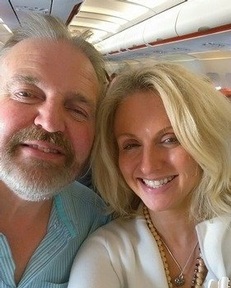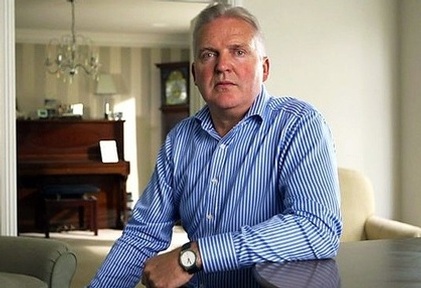'His death felt like abandonment', says wife of care director who went to suicide clinic
The wife of Simon Binner, who chose to have an assisted death in Switzerland aged 57, has revealed how his death “felt like abandonment” and “still feels unresolved”.

Although she respected his decision, Deborah Binner has detailed her reaction to her husband’s one-way trip to a suicide clinic in her book ‘Yet Here I Am’, published on 12 November.
She explained: “After a gruelling 10-month battle with the most aggressive form of motor neurone disease, he decided an assisted death was the only option. A decision I respected but disagreed with.
“His death felt very much like abandonment and like it wasn't a collaborative act."
The former operations director of Caremark (Sutton) made the decision to seek assisted suicide after he was diagnosed with progressive bulbar palsy in January 2015 – a fast-moving form of motor neurone disease (MND).
Ms Binner initially told her husband that she wouldn’t go with him to Switzerland but changed her mind after he attempted suicide twice at their home. They were accompanied by a BBC film crew which made a documentary in 2016 - ‘How to Die: Simon’s Choice’.
“It was so much less about us as a loving couple than it was about an audience,” explains Ms Binner. “I think he needed this, as the intimacy of a private death would have been too painful for him. It would have meant facing up to it more directly, without distraction.”
’I know that his intentions were entirely pure’
Simon died at the Eternal Spirit clinic on 19 October 2015. Tributes poured in from care professionals, praising their ‘friend’ and ‘boss’, who they say, “changed the game” in care for people in the London Borough of Sutton.
The couple’s trip to the clinic in Basel came less than three years after Ms Binner’s 18-year-old daughter Chloë died of Ewing's sarcoma - a type of bone cancer.
After her death, Ms Binner found that “... a certain closure slowly arose in me; I knew I had left no stone unturned in an almighty battle to save her. And in the end, her death was soft, gentle, supported and at home. “She told me she was happy and unbelievably, for that moment, I was happy too. I touched on love at its very deepest level.”
But her husband’s passing was quite different.
In ‘Yet Here I Am’ she wrote: “Simon’s death feels unresolved. To me it felt angry, rejecting and abrupt. It felt a lot like a suicide. I think he genuinely thought that taking his life was courageous and that it would save us a lot of heartache seeing him spiral into full disability.
'While Simon’s turmoil had ended, in some ways mine was just beginning'

“I know that his intentions were entirely pure. But surely it is equally brave to live with an illness, a disability, to embrace vulnerability and to accept that none of us really has that much control.”
She continues: “While Simon’s turmoil had ended, in some ways mine was just beginning. I didn’t want Simon to suffer, but I didn’t want him to die, either. Watching him plan his own death, while I still wanted more time, was overwhelmingly traumatic.”
As a result of her experience, she is not an advocate for assisted dying, which remains illegal in the UK, with MPs rejecting a change in the law on the subject as recently as 2015 in the form of the Assisted Dying Bill.
She said: “I worry deeply about how people who are ill can lose the sense of mattering to other people. If there was the option of ending it all relatively simply, would they feel pressure to opt for that rather than become a ‘nuisance’?”
“My head understands the intellectual arguments and I find it hard to disagree with them. But my heart still says no. Should we not be kinder, more patient, more respectful of human life?
“Isn’t how we support the dying so central to who we are as human beings? And there’s a part of me that believes it’s better, if a person has the best possible care, to let nature take its course. Personally, I am absolutely fuming that my husband left me to fend in this world alone. That was not the deal.”
Caremark (Sutton) is an established home care provider offering domiciliary care, personal support, home help and companionship services to individuals living within their own homes. It is run by Ms Binner and her daughter Hannah Drury, operations director.
Together, they are committed to driving forward Simon's vision to be the best provider of care and the best employer of care workers in the borough.
For more information on ‘Yet Here I Am: One Woman's Story of Life After Loss’ visit: www.amazon.co.uk/Yet-Here-Am-Womans-Story/dp/1909109770
Latest Features News
 28-Nov-19
2019 Election: Labour pledges £10.8 bn for free personal care while Boris Johnson sidelines social care
28-Nov-19
2019 Election: Labour pledges £10.8 bn for free personal care while Boris Johnson sidelines social care
 18-Oct-19
Podcast: Wendy Mitchell and dementia: 'My biggest fear is not knowing who my daughters are'
18-Oct-19
Podcast: Wendy Mitchell and dementia: 'My biggest fear is not knowing who my daughters are'
 30-Sep-19
World's oldest diver aged 96 says 'never accept the fact you are getting old'
30-Sep-19
World's oldest diver aged 96 says 'never accept the fact you are getting old'
 27-Sep-19
Exclusive: Care minister backs care workers' call for time off to grieve and attend funerals
27-Sep-19
Exclusive: Care minister backs care workers' call for time off to grieve and attend funerals
 20-Sep-19
Podcast: Gyles Brandreth urges care workers to learn poetry with elderly
20-Sep-19
Podcast: Gyles Brandreth urges care workers to learn poetry with elderly